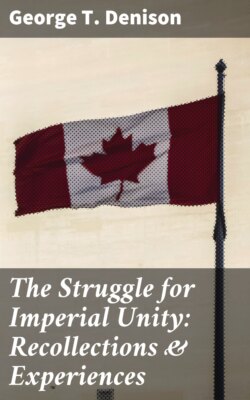Читать книгу The Struggle for Imperial Unity: Recollections & Experiences - George T. Denison - Страница 7
На сайте Литреса книга снята с продажи.
CONDITION OF AFFAIRS IN CANADA BEFORE
CONFEDERATION
ОглавлениеTable of Contents
The extraordinary change that has taken place in Canada, in every way, in the last fifty years cannot be appreciated except by those who are old enough to remember the condition of affairs about the middle of last century. The ideas, sentiments, aspirations, and hopes of the people have since then been revolutionised. At that time the North American Provinces were poor, sparsely settled, scattered communities, with no large towns, no wealthy classes, without a literature, with scarcely any manufactures, and with a population almost entirely composed of struggling farmers and the few traders depending upon them. The population was less than 3,500,000. The total exports and imports in 1868 were $131,027,532. The small Provincial Governments found their duties confined to narrow local limits. All the important questions were entirely in the hands of the Home Government. The defence was paid for by them. British troops occupied all the important points, and foreign affairs were left without question entirely in the hands of the British statesmen. The Provinces had no power whatever in diplomacy, and were interested only in a few disputes with the United States in reference to boundary difficulties, which were generally settled without consultation with the Colonial Governments, and with very little thought for the interests or the future needs of the little British communities scattered about in North America.
The settlements were comparatively so recent that men called themselves either English, Irish, or Scotch, according to the nationality of their parents or grandparents. The national societies, St. George’s, St. Andrew’s and St. Patrick’s, may have helped to continue this feeling, so that in reference to the various Provinces there was not, and could not be, any national spirit. Another cause that led to the absence of national spirit or self-confidence was that Great Britain not only held the power of peace and war in her own hands, but, as a consequence, took upon herself the responsibility for the defence of the Provinces. British troops, as has been said, garrisoned all the important points, and all the expenses were borne by the Imperial Government. Canada had no militia except upon paper, no arms, no uniforms, no military stores or equipment of any kind. She depended solely upon the Mother Country; even the Post Office System was a branch of the English Post Office Service. One can readily imagine the lack of local national spirit. Of course the loyalty to the Mother Country and the Sovereign and the Empire was always strong, but it was not closely allied to the spirit of nationality as attached to the soil.
When the Crimean war broke out, the British troops were required for it, and Canada was called upon to raise a militia force for her own needs. This she did. Ten thousand men were organised, armed, uniformed, and equipped at her expense. They were called the Active Militia, and were drilled ten days in each year. The assumption of responsibility had an effect upon the country, and when the Trent difficulty arose the force was increased by the spontaneous action of the people to about thirty-eight thousand men. Four years later the Fenian raids took place upon our frontier, and were repulsed, largely by the efforts of the Canadian Militia. All this appealed to the imagination of our youth, and as confederation was proclaimed the following year the ground was fallow for sowing seeds of a national spirit.
The effect of confederation on the Canadians was very remarkable. The small Provinces were all merged into a great Dominion. The Provincial idea was gone. Canada was now a country with immense resources and great possibilities. The idea of expansion had seized upon the people, and at once steps were taken looking to the absorption of the Hudson’s Bay Territory and union with British Columbia.
With this came visions of a great and powerful country stretching from ocean to ocean, and destined to be one of the dominant powers of the world.
